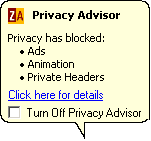 Privacy
protection
Privacy
protection  Privacy
protection
Privacy
protection ![]() Note
Privacy protection is enabled for your browser only if you selected it during
setup. If you did not enable privacy during setup, you can enable it by going
to the Main tab of the Privacy panel and raising the Cookie Control and Ad Blocking
sliders to the level you desire.
Note
Privacy protection is enabled for your browser only if you selected it during
setup. If you did not enable privacy during setup, you can enable it by going
to the Main tab of the Privacy panel and raising the Cookie Control and Ad Blocking
sliders to the level you desire.
Cookie control keeps advertisers from spying on your Internet habits. High security settings keep sensitive information (passwords, for example) from being stored in cookies, where they can be stolen if a hacker breaks into your computer.
What is a cookie?
A "cookie" is a small text file that a Web site places on your computer.
A cookie that stays on your computer a long time (called a persistent cookie) lets the Web site remember who you are, so that the next time you visit, it can customize what you see. For example, this is how Amazon.com shows you books you're likely to want each time you visit.
A cookie placed by someone other than the Web site host (called a third-party cookie) can be used to record information about your Internet habits—for example, which advertisements you click on. These cookies are often placed by advertisers.
The default Medium cookie control setting allows session cookies and persistent cookies, but blocks third-party cookies. This protects you from information leaks while preserving the convenient functions of cookies.
|
ZoneAlarm Pro blocks the cookie and displays the Privacy Advisor at the bottom of your screen. Privacy Advisor tells you that ZoneAlarm Pro has blocked a Web page element. For more information about the Privacy Advisor, see below. |
Tip You can set cookie control to block session and persistent cookies as well. See the related topic Cookies tab. |
Ad blocking keeps unwanted advertisements from disrupting your Internet work.
With ZoneAlarm Pro, you can block all types of ads or only specific types:
ZoneAlarm Pro blocks pop-up and pop-under ads. It's as if they didn't exist.
ZoneAlarm Pro also blocks banner and skyscraper ads if they take more than a few seconds to load. This is called performance ad blocking, and keeps advertisers from slowing down your Web experience.
![]() Tip
You can customize ad blocking to stop block all banner and skyscraper ads, or
to stop only specific types of ads. See the related topic, Ad blocking tab.
Tip
You can customize ad blocking to stop block all banner and skyscraper ads, or
to stop only specific types of ads. See the related topic, Ad blocking tab.
Mobile code control keeps hackers from using active Web page content such as Java applets, ActiveX controls and plug-ins to compromise your security or damage your computer.
|
What is mobile code? Mobile code is active or executable Web page content. Some examples include Java applets, ActiveX controls, and Javascript. Properly used, mobile code makes Web pages more interactive and dynamic. But malicious mobile code, can copy files, wipe out a hard disk, steal passwords, or command servers. |
|
ZoneAlarm Pro blocks the code and displays the Privacy Advisor (highlighted at left) at the bottom of your screen. The Advisor tells you that ZoneAlarm Pro has blocked a page element, and gives you access to controls to unblock it for the current Web site if you want to. For more information about the Privacy Advisor, see below. |
Note Mobile code control is turned OFF by default. To turn it on, go to the Main tab of the Privacy panel.
Tip You can choose to block some types of mobile code and allow others. See the related topic, Mobile Code tab.
 The
Privacy Advisor appears whenever ZoneAlarm Pro blocks ads, cookies, or mobile
code from the Web site you are visiting, and lists the type of Web page element
that was blocked.
The
Privacy Advisor appears whenever ZoneAlarm Pro blocks ads, cookies, or mobile
code from the Web site you are visiting, and lists the type of Web page element
that was blocked.
If want to see details of the blocked elements, or allow the page elements that ZoneAlarm Pro has blocked, click the link labeled Click here for details.. The ZoneAlarm Pro Control Center opens to the Privacy panel, where you can change general privacy settings, or settings for site you are visiting. If you don't click Advisor pop-up, it disappears automatically in a few seconds.
To prevent Privacy Advisor from appearing each time Web page elements are blocked, select the check box labeled Turn Off Privacy Advisor.
For more information, see the related topic Using
Privacy Advisor.
By default, privacy protection is applied only to standard browser programs such as Internet Explorer. If you wish, you can also enable privacy protection for any other program on your computer by using the Security tab.
Ad blocking tab
Cookies tab
Main tab (Privacy panel)
Mobile code tab
Site List tab
Using Privacy Advisor
session cookie
A cookie stored in your browser\'s memory cache that disappears as soon as you
close your browser window. These are the safest cookies because of their short
life-span.
persistent cookie
A cookie put on your hard drive by a Web site you visit. These cookies can be
retrieved by the Web site the next time you visit. While useful, they create
a vulnerability by storing information about you, your computer, or your Internet
use in a text file.
third party cookie
A persistent cookie that is placed on your computer, not by the Web site you
are visiting, but by an advertiser or other \'third party.\' These cookies are
commonly used to deliver information about your Internet activity to that third
party.